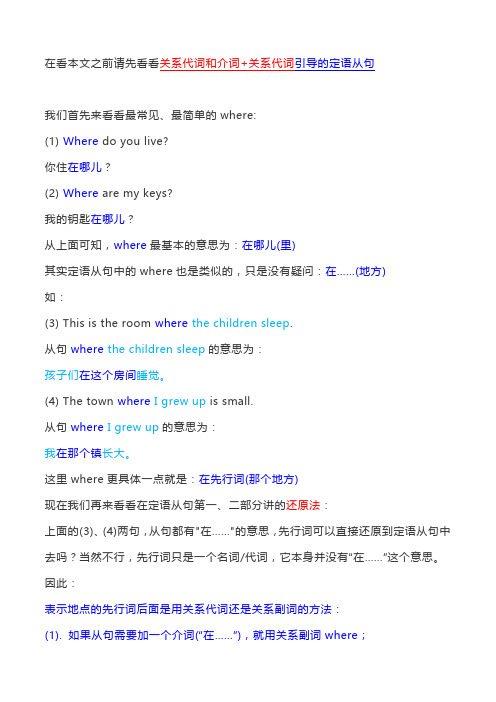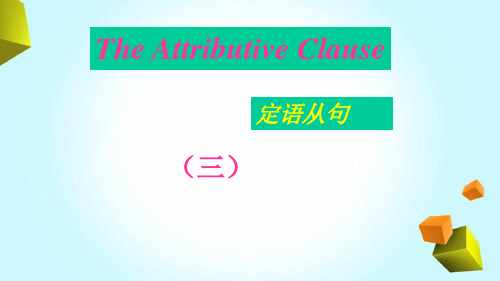定语从句3
定语从句(3)从句的本质

定语从句(3)从句的本质从句的本质是:句子作成分/词类在简单句中,成分都是由单词或短语充当的:I know you.主语是I ;谓语是know ;宾语是youI enjoy reading novels.主语是I ;谓语是know ;宾语是reading novels(动宾短语)I know he is ill.主语是I ;谓语是know ;宾语是he is ill(句子)我们可以看出:最后的句子He is ill 是作了句子成分的,作宾语,因此可以叫它为“宾语从句”从另一个角度来说:这个句子相当于一个名词,因此可以叫做“名词性从句”That she finished reading an English novel surprised us all.上面的句子当中,句子She finished reading an English novel作了主语,因此叫“主语从句”,也相当于名词,还可以叫做“名词性从句”She finished reading an Englishnovel yesterday. She finished reading an Englishnovel at the age of 12.She finished reading an Englishnovel when she was 12.从上面的变化情况我们可以看出,从单词作成分,短语作成分到句子作成分,作的都是状语,因此从句叫“状语从句”,或叫“副词性从句”。
The little girl finished reading an English novel. The girl in school uniform finished reading an English novel.The girl who is 12 finished reading an English novel.从上面的变化情况我们可以看出,从单词作成分,短语作成分到句子作成分,作的都是定语,因此从句叫“定语从句”,或叫“形容词性从句”。
Unit 6定语从句练习3

定语从句(The Attributive Clause)(三)一、相同先行词使用不同的关系词:我们前面讲过:1)当先行词是表示时间的名词时,用关系副词when;例如:I will remember the day when I joined the Party.2)当先行词是表示地点的名词时,用关系副词where;例如:This is the house where I was born.3)当先行词是表示原因的名词时,用关系副词why;例如: This is the reason why he was late.而事实上并非如此。
我们看下面的一组句子:1. I will remember the day______ I joined the Party.I will remember the day______ we spent together.在第1组句子中,我们得到答案:a) I will remember the day _when__ I joined the Party.b) I will remember the day that/which_ we spent together.有的同学可能要问同样是表示时间的先行词the day,为什么第一句用关系副词when,而第二句关系代词that/which呢?我们可以把a)句I will remember the day ______I joined the Party.拆开就得到两个句子:①I will remember the day.②I joined the Party on the day.在这两个句子中先行词是物the day,所以我们用关系代词that/which,根据句意可知第一句为主句,所以我们得到: I will remember the day that/which I joined the Party on.把介词on提前,即得:I will remember the day on which I joined the Party而on which=when,亦即:I will remember the day when I joined the Party.所以第a)句填when.我们可以把b)句I will remember the day______ we spent together..拆开就得到两个句子:①I will remember the day.②we spent the day together.在这两个句子中先行词是物the day,所以我们用关系代词that/which,根据句意可知第一句为主句,所以得到:I will remember the day that/which we spent together.所以第b)句填that/which.我们再看一组句子:a)This is the house _______I was born.b) This is the house ________I was born in.我们可以把a)句This is the house _______I was born拆开就得到两个句子:①This is the house.②I was born in the house.在这两个句子中先行词是物the house,所以我们用关系代词that/which,根据句意可知第一句为主句,所以我们得到:This is the house that/which I was born in.把介词in提前,即得:This is the house in which I was born.而in which=where,亦即:This is the house where I was born..所以第a)句填where.我们可以把b)句This is the house _______I was born in.拆开就得到两个句子:①This is the house.②I was born in the house.在这两个句子中先行词是物the house,所以我们用关系代词that/which,根据句意可知第一句为主句,所以我们得到:This is the house that/which I was born in.所以第b)句填that/which.我们看第三组句子:a)This is the reason ________he was late.b) This is the reason ________he gave.我们可以把a)句This is the reason ________he was late.拆开就得到两个句子:①This is the reason.②He was late for the reason.在这两个句子中先行词是物the reason,所以我们用关系代词that/which,根据句意可知第一句为主句,所以我们得到:This is the reason that/which he was late for.把介词for提前,即得:This is the reason for which he was late.而for which=why,亦即:This is the reason why he was late..所以第a)句填why.我们可以把b)句This is the reason ________he gave.拆开就得到两个句子:①This is the reason.②He gave the reason.在这两个句子中先行词是物the reason,所以我们用关系代词that/which,根据句意可知第一句为主句,所以得到: This is the reason that/which he gave.所以b)句填that/which.从以上三组例子,我们可以看出,当先行词是表示时间、地点、原因的名词时并不一定用关系副词when, where, why;而可以用关系代词that/which。
定语从句(3)关系副词引导的定语从句

在看本文之前请先看看关系代词和介词+关系代词引导的定语从句我们首先来看看最常见、最简单的where:(1) Where do you live?你住在哪儿?(2) Where are my keys?我的钥匙在哪儿?从上面可知,where最基本的意思为:在哪儿(里)其实定语从句中的where也是类似的,只是没有疑问:在……(地方)如:(3) This is the room where the children sleep.从句where the children sleep的意思为:孩子们在这个房间睡觉。
(4) The town where I grew up is small.从句where I grew up的意思为:我在那个镇长大。
这里where更具体一点就是:在先行词(那个地方)现在我们再来看看在定语从句第一、二部分讲的还原法:上面的(3)、(4)两句,从句都有"在……"的意思,先行词可以直接还原到定语从句中去吗?当然不行,先行词只是一个名词/代词,它本身并没有“在……”这个意思。
因此:表示地点的先行词后面是用关系代词还是关系副词的方法:(1). 如果从句需要加一个介词(“在……”),就用关系副词where;(2). 如果从句不缺介词(“在……”),就用关系代词:第一种情况:已经有了介词“在……”第二种情况:不需要介词“在……”(直接作主语、宾语、表语或表示所属关系) 例如:例3的先行词还原到从句变为:The children sleep the room.这个句子the room前面需要加上介词(in)才对。
所以用关系副词where。
如果这个句子改动一下变为:(5) This is the room _______ the children sleep in.这个句子的定语从句部分已经有介词in,先行词可以直接还原(作介词宾语):The children sleep in the room.因此,此题用关系代词that/which或省略。
定语从句(3)

第二部分 专题九
第2页
高考一轮总复习 ·英语
学习目标
理解定语从句,先行词,关系词
第
1 学会选择关系词
步
学习重点
第
3
掌握如何正确选择关系词
步
第
2 学习难点
步
判断关系词在从句中做什么成分
介词+关系代词的用法
第二部分 专题九
第3页
高考一轮总复习 ·英语
展示任务
1. 定语从句的相关概念(定语从句 先行词 关系词 )
第
1 2. 什么情况下只能用关系词that? 什么情况下只能用which?
步
3. “介词+关系代词”引导的定语从句中,怎么选择介词和 第
关系代词
3 步
第 4. Which 和 as 引导定语从句的区别
2
步 5. 以 way 和 time 为先行词的定语从句。
6. 高考应用与策略
7. 高考演练
8. 课堂小结
第二部分 专题九
第17页
高考一轮总复习 ·英语
第
1 步
考点三 “介词+关系代词”引导的定语从句
1.若介词放在关系代词之前,关系代词指人时常用 whom,第
3
指物时常用 which。另外,whose 也可以放在介词后,即“介 步
第 2
词+whose+名词”结构。
步
第二部分 专题九
第18页
高考一轮总复习 ·英语
步
第 2
2.当定语从句中缺少主语或宾语时,即使先行词是表示时
步
间、地点和原因的词仍用 which/that 引导定语从句。
第二部分 专题九
第14页
高考一轮总复习 ·英语
定语从句三要素

定语从句三要素1.先行词;2.引导词;3.引导词再从句中的成分。
定语从句(也称关系从句、形容词性从句),是指一类由关系词引导的从句,因为这类从句的句法功能多是做定语,所以曾被称为定语从句,这类从句除了可以做定语之外,还可以充当状语等其它成分。
1.先行词:被定语从句所修饰的名词或代词①指人的先行词②指物的先行词先行词还可以是前面整个句子所叙述的事情。
He has passed the driving test, which surprises all of us.(which替代前面所叙述的事情) 先行词2.关系词:引导定语的词(1)关系词的作用①替代前面的先行词(替代作用)②连接主句和定语从句(连接作用)③在定语从句中作句子成分(成分作用)(2)关系词的分类①标准:根据关系词在从句中做的句子成分种类②关系代词:在从句中做主,宾,表,定(that/which/who/whom/whose/as)③关系副词:在从句中作状语(When/where/why)3.定语从句:用来做定语,修饰限定先行词的句子1.限制性定语从句:对先行词起限定修饰作用。
He is a teacher who works at our school.2.非限制性定语从句:对先行词起补充说明作用(先行词与定语从句之间有逗号隔开)Beijing, which is the capital of China, is a beautiful city with a long history.比较:He has two sons, who work in the same company. (He has only two sons.)He has two sons who work in the same company. (Perhaps he has two more sons)。
定语从句 3

He lives in a house whose windows open to the
south. 他住在一所窗户朝南的房子里。
指物
把两句话合成一句话
That is the new machine. The parts of it are too small to see.
That’s the machine whose parts are too small to see. whose 指人的或物的,在从句中作定语。
THANK.
翻译下面句子并找出先行词与定语从句。
1. This is the woman whose name is known all over the country.
(这个是一个名字被整个国家所熟知的女科学家.)
2. He lives in a room whose window faces north.
Laoshe.
简借了老舍写的那本书。
主语
找一找下列句子中的关系词、识别其在定语从句中所作成分。
⑤ We weren’t playing on the court which was next to our
buliding. 我们没有在紧挨着我们住所的球场上打球。 主语 ⑥ Tyrone Bogues, a guy who played for the Charlotte Hornets.
定语
包是新的那个女孩叫安。
三、练习题:
1、翻译下面句子并找出先行 词与定语从句
1. shelter 避难所 2. survivor 幸存者 3. destroy 破坏; 4. canal 运河 5. dialect 方言 6. crack 裂缝 7. kilometre 千米
人教版高一英语必修二语法unit1-定语从句-(3)限制性非限制性定从

A. whom
B. who C. / D. he
• 13. The boy ___D__ has two lovely dogs.
A. who live next door B. which lives next door
C. whom lives next door D. that lives next door
This is the same instrument that I used yesterday.
是我昨天用过的那一个--同一个
This is the same instrument as I used yesterday.
跟我昨天用过的那台一样--长得像
表示说话人的看法、态度、解释或评论。此时as可以翻译为 “正如;就像”等。由as引导的从句可在句首,句中或句尾。
He is so honest a boy as everyone likes.
He is not the same man as he was.
so/such...as...与 so/such...that...
在限制性定语从句中,当先行词被so\such修饰时,关系词用as, 在从句中充当成分。 但so/such...that引导结果状语从句,连接 词在句中不充当成分,没意义。
as often happens
正如经常发生的那样
as can be seen/ judged from... 从...中可以看出、判断出
as和which引导非限制性定语从句的区别:
1) 含义的区别 as 有“正如,就像”之意,表示依据、看法、态度等; which 多译为 “这;这一点”,表示事实、转折、起因、让步等。
A. /, to B. that, / C. where, to D. which, there
定语从句语法解析(三)

定语从句语法解析(三)五、紧缩的定语从句1. 关于“介词+关系代词+不定式”该结构主要用于正式文体中,相当于一个被紧缩的定语从句:She must have time in which to grow calm. 她必须有冷静下来时的时间。
Allow me one minute in which to change my clothes. 给我一点时间换衣服。
He was miserable unless he had neighbors with whom to quarrel. 他要是没有邻居吵架就难受。
注意,该结构中的介词不能没有,也不能位于不定式后面:在那儿孩子们有个玩耍的花园。
正:There the children had a garden in which to play. (很正式)正:There the children had a garden in which they could play. (较正式)正:There the children had a garden to play in. (较口语化)误:There the children had a garden which to play in.2. 将定语从句转化为分词短语有时为了简洁起见可将定语从句转化为分词短语作定语:Who’s the girl who is sitting beside Jim? / Who’s the girl sitting beside Jim? 坐在吉姆旁边的女孩是谁?Most of the people who were invited to the party were teachers. / Most of the people invited to the party were teachers. 应邀参加晚会大多数是教师。
Anyone who touches that wire will get a shock. / Anyone touching that wire will get ashock.任何人触到那根电线都会遭到电击。
- 1、下载文档前请自行甄别文档内容的完整性,平台不提供额外的编辑、内容补充、找答案等附加服务。
- 2、"仅部分预览"的文档,不可在线预览部分如存在完整性等问题,可反馈申请退款(可完整预览的文档不适用该条件!)。
- 3、如文档侵犯您的权益,请联系客服反馈,我们会尽快为您处理(人工客服工作时间:9:00-18:30)。
Fill in the blanks using “prep+whom/which”. 1. The book _o_f/_a_b_o_u_t_w__h_ic_h_ I heard
B. This is the tree _u_n_d_e_r_ which we used to play games.
3. Find out the meaning of the clause.
A. The pen _w_i_th_ which he is writing now was bought yesterday. (He is writing with the pen.)
in the rush hour.
A. which
B. in which
C. for which
D. of which
5. His glasses, _____ he could see nothing,
was taken away by a naughty boy.
A. which
B. without which
6. The gun _w_i_th__w__h_ic_h_ he was shot was never found.
Review
“介词+关系代词”引导的定语从句, 关 系代词只能用which和whom, 且不能省 略。介词主要根据三个方面来选择: 一 是先行词与介词的搭配; 二是定语从句 中谓语动词或形容词与介词的搭配; 三 是根据 “介词+关系代词” 在从句中的 作用及意义。
was written twenty years ago.
2. The people _to_/_w_i_th__w__h_o_m_ the man spoke weren’t listening.
3. The film _d_u_r_in__g_w_h__ic_h_ I fell asleep was very boring.
1. Have you ever dreamed of playing in front of thousands of people at a concert, at which everyone is clapping and appreciating your music?
2. They may start as a group of highschool students, for whom practising their music in someone’s house is the first step to fame.
why可以替代for which。 The reason why/for which he left the band was that he hated the busy life. how可以替代in which,但是要同时去掉 the way。 The students do not know how/the way in which a music band can be formed.
How to choose the right prepositions
1. Find out which verb the preposition is used with.
A. Have you met the person _w_i_th_/_t_o_/a_b_o_u_t_ whom he was speaking?
4. The pen _w_i_t_h_w__h_ic_h_ she wrote that book can now be seen in a museum.
5. The little creature _i_n__w_h_i_c_h__ scientists are interested is known as ET.
Individual activity
注: 另附 word 文档。 点击此处链接
Quiz I: Multiple choice.
1. Yesterday Mr. Li finally bought his
own house, _______ is a hospital.
A. in where
B. to the east of which
5. However, after a year or so in which they became more serious about their work, the Monkees started to play and sing their own songs like a real band.
11. He was educated at the local high
school, ______ he went on to Beijing
University. (2007江苏)
A. after which
B. after that
C. in which
D. in that
12. Human facial expressions differ from
6. They produced a new record in 1996, with which they celebrated their former time as a real band.
当先行词是人时,用介词+whom引导 定语从句。 They may start as a group of highschool students, for whom practising their music in someone’s house is the first step e here?
When did you come here?
When did you come here?
When did you come here?
We came here on June 16, 2012.
It was the day _w_h_e_n__/ _o_n_w__h_ic_h_ we were sent into space.
A. in which
B. which
C. through which D. by which
9. Last week, only two people came to look at the house, _______ wanted to buy it. A. none of them B. both of them C. none of whom D. neither of whom
competed yesterday was very wonderful.
A. in which
B. which
C. in that
D. that
4. The reason _______ he was late again
was that he was caught in a traffic jam
当先行词是物时,用介词+which引导 定语从句,而且只能加which,不能 加that。 They produced a new record in 1996, with which they celebrated their former time as a real band.
关系副词可以替代介词+which/whom 结构。 where可以替代to/at/from/in which。 They visited the city where/in which John Denver was born. when可以替代during/at/in/on which。 I will never forget the year when/in which our band started.
C. with which D. without those
6. The computer, ______ he paid ¥3,000,
was once owned by his uncle.
A. which
B. for which
C. that
D. to that
7. Mary has two brothers, ________ are
B. He is the man _t_o_ whom you should give your thanks.
2. Find out which noun or pronoun the clause modifies (修饰).
A. The farm _o_n_ which we worked ten years ago isn’t what it used to be.
C. to the east of it D. in the east of that
2. My brother's purse, _______ he put
¥1,000, was missing on the bus.
A. there
B. which
C. in which
D. that
3. The football match _______ the students
Unit 5 Grammar
The Attributive Clause
(prep + which / whom)
Objective
To learn and use the attributive clause (prep + which / whom).
Pay attention to these attributive clauses in the passage that contain prep. + whom / which.
